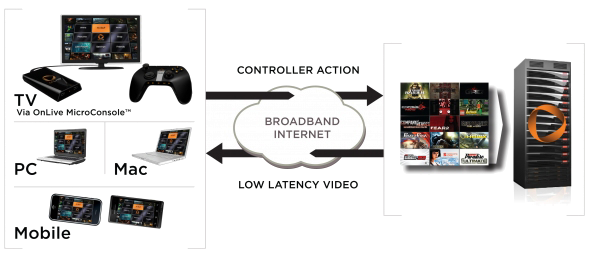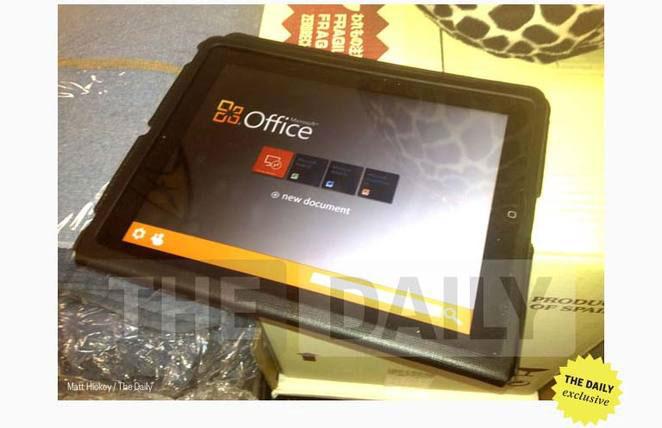Microsoft challenging licensing of OnLive's Windows 7 virtualization for iPad
OnLive, which started by offering PC gamers subscription based access to a virtualized session hosted in the cloud (allowing them to play games with graphics rendered by more powerful hardware than they had locally), first brought its technology to the iPhone in late 2009.
In January, OnLive began offering a Desktop app "delivering an instant-response Windows desktop and full-featured Microsoft Office apps to your iPad," followed by a $4.99 per month Plus service that added support for accelerated Adobe Flash, all of which are rendered 'in the cloud' and delivered to a user's iPad over WiFi or fast mobile networks.
The company also said it plans to offer Pro and Enterprise versions with more cloud storage and customized environments and collaborative services, and added an Android client similar to its iPad app.
Interest in OnLive has captured the notice of Microsoft, which posted a blog notice from Joe Matz, the company's Corporate Vice President of Worldwide Licensing and Pricing.
Without ever referencing Apple's iPad by name, Microsoft stated "Some inquiries about these [licensing] scenarios have been raised as a result of recent media coverage related to OnLive’s Desktop and Desktop Plus services." Matz said Microsoft is now "actively engaged with OnLive with the hope of bringing them into a properly licensed scenario, and we are committed to seeing this issue is resolved."
Licensing terms oriented toward conventional PCs
The violation Matz alluded to in general terms states that "customers that want to work with partners to have them host Windows 7 in a Virtual Desktop Infrastructure solution on their behalf, can do so when the customer provides the partner licenses through the customer’s own agreements with Microsoft," and that "the hosting hardware must be dedicated to, and for the benefit of the customer, and may not be shared by or with any other customers of that partner."
OnLive's business would appear to only make sense if it were sharing its server hosting services across all of its free or $5 per month subscribers, and iPad users are not suppling their own licenses for Windows 7 to use the service.
Additionally, Matz wrote, "Microsoft partners who host under the Services Provider License Agreement ('SPLA') may bring some desktop-like functionality as a service by using Windows Server and Remote Desktop Services.
"Under this solution, the partner is free to offer this service to any customer they choose, whether or not they have a direct licensing agreement with Microsoft. However, it is important to note that SPLA does not support delivery of Windows 7 as a hosted client or provide the ability to access Office as a service through Windows 7. Office may only be provided as a service if it is hosted on Windows Server and Remote Desktop Services."
Post PC Licensing
Commenting on Matz' blog posting, reader Simon Bramfitt noted, "You have to acknowledge that it is long past time for Microsoft to address the shortcomings within its current licensing policy with regard to VDI.
"The increasing adoption of mobile technologies coupled with the consumerization of IT and bring your own device programs is increasingly blurring the boundaries between corporate devices and personal devices. Microsoft's licensing policies in this regard have failed to keep up with these trends and needs to be addressed promptly."
Andrew Fidel echoed the same opinion, writing "How about fixing it so that SPLA partners can offer a proper VDI environment? You can offer almost any other piece of Microsoft software through SPLA including stripping down a 2008R2 RDS session to be nearly identical to Windows 7 but for some reason Microsoft is being stubborn on offering what their end customers and partners actually want."
Microsoft is rumored to have developed a version of Office for iPad, but appears to be hesitant to release it, directing interest toward its own Windows 8 tablet plans instead, perhaps hoping to see if its Office software could be leveraged as a differentiating factor to push sales of Windows 8 tablets when the begin to appear at the end of this year or in early 2013.
 Daniel Eran Dilger
Daniel Eran Dilger












 Christine McKee
Christine McKee
 Malcolm Owen
Malcolm Owen
 Mike Wuerthele and Malcolm Owen
Mike Wuerthele and Malcolm Owen

 William Gallagher
William Gallagher









